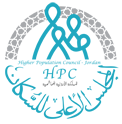

The second part of the Training of Trainers Course on Sexual and Reproductive Health and Reproductive Rights, organized by the Higher Population Council, was launched on Monday with the participation of sexual and reproductive health partners.
This course, which lasts until 30 September 2021, is part of a project on more sustainable services and solutions to the sexual and reproductive health and reproductive rights needs of young people and refugees in Jordan in Amsterdam, which is being carried out in partnership with VRIJE academy and Holland University, Royal Dutch Equatorial Institute, local council partners from Yarmouk University and the Jordanian Mountain People's Society, with funding from Dutch International Education organization Nuffic.
The higher population council lead researcher and project manager Manal Ghazzawi indicated that the project's most prominent objective was to design a unified approach based on international standards to implement and coordinate efforts in a more structured way to address sexual and reproductive health issues effectively and efficiently, with particular emphasis on the most vulnerable communities in Jordan, and to improve cooperation among key stakeholders. (Government organizations, knowledge institutions and community-based organizations), improving the knowledge and skills of trainers on the concepts of sexual and reproductive health and gender equality, through the establishment of a joint training academy on sexual and reproductive rights and health with a focus on gender and human rights education.
Manal Ghazzawi pointed out that the project would contribute to reducing the challenges faced by Jordan in the area of sexual and reproductive health, namely, that there are false societal beliefs about these issues that generate harmful attitudes and behaviours that pose a societal problem also The lack of national manuals and training guidance within international standards, the lack of specialized sexual and reproductive health trainers and the limited distribution of qualified human resources in health and non-health sectors impede the provision of high-quality sexual and reproductive health services and information and basic reproductive rights, especially for young people and the limited awareness-raising activities involving the participation and involvement of society, as well as gender inequality, and the fact that not all existing awareness-raising programmes in Jordan are comprehensive and specialized in raising awareness about the sexual and reproductive health of adolescents and young people, and it does not take into account the needs of the special age groups within the broad youth group, and lack deep coverage of these issues. Ghazzawi noted that the second part of the training will focus on identifying adolescent and youth priorities and the need for sexual and reproductive health, analysing effective responses in Jordan with a focus on refugee situations, discussing gender inequality in health and well-being in refugee settings, and analysing how gender is addressed in sexual and reproductive health interventions, and to inform the trainees on the basis, methodology, and how to take into account gender and sociocultural issues in places of sexual and reproductive health. It is noted that the first part of the training course was held during the period 12-15 July 2021.







